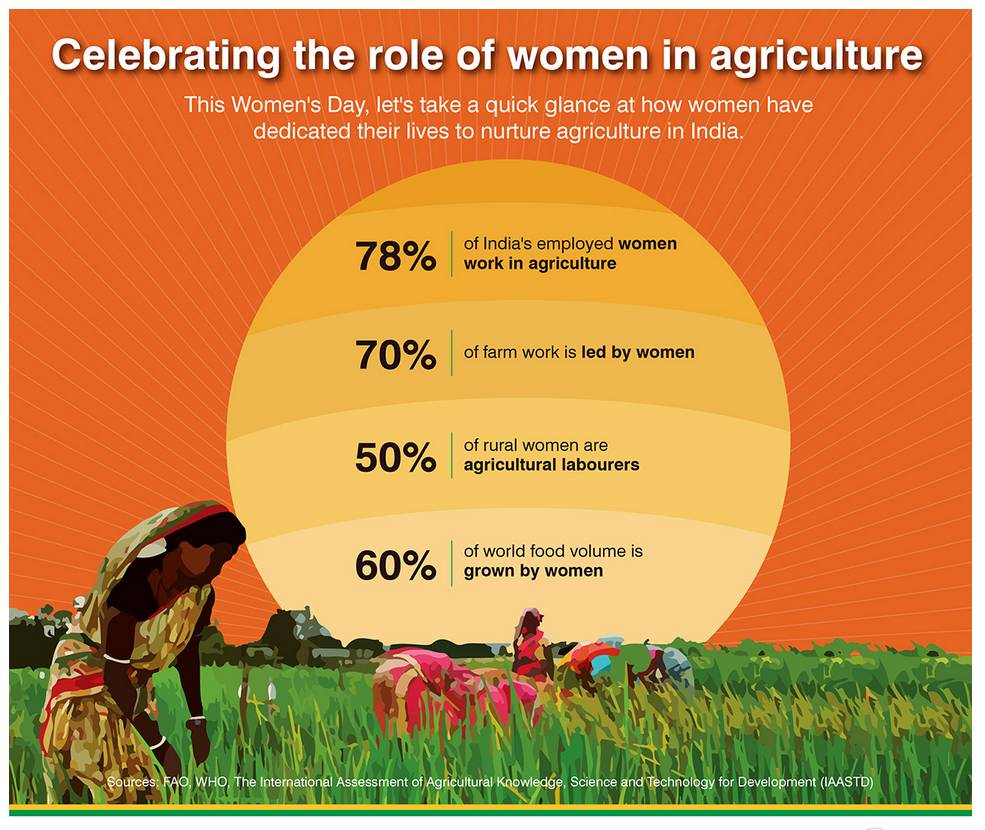Ahmedabad
(Head Office)Address : 506, 3rd EYE THREE (III), Opp. Induben Khakhrawala, Girish Cold Drink Cross Road, CG Road, Navrangpura, Ahmedabad, 380009.
Mobile : 8469231587 / 9586028957
Telephone : 079-40098991
E-mail: dics.upsc@gmail.com

Feminization of Agricultural sector – Its impact
What contributes to Feminization of agricultural sector?
• According to 2011 census, approximately 33.7% of rural males migrate in search of employment and better economic opportunities. This trend is one of the reason that has contributed to feminization of agriculture.
• The nature of work in urban areas such as construction laborers, rickshaw pullers and unsafe living conditions there force the rural men to leave their families behind in the villages.
• Women are more willing to accept low-paid irregular work, are easy to hire and fire, are thought to be docile and hardworking, and certain jobs are typified as women’s work.
• Poverty forces women to work as agricultural laborers or domestic laborers in order to supplement family income.
What are the impacts of feminization of agricultural sector?
• Serious cause of social exclusion and injustice as women are forced to sacrifice education and skill development opportunities to manage household and agriculture.
• Work overload leaves women with inadequate time for their children. Despite economic gains derived from male migration, parental absence may lead directly to decreased care and supervision, negatively affecting child rearing.
• Spousal separation due to male migration, lack of companionship, and increased household responsibilities may trigger mental health problems in left-behind female spouses of migrant workers.
• Agricultural productivity may suffer as well because women are left alone to arrange everything from inputs, seeds, fertilizer and labor.
• Continued marginalization in terms of land ownership despite pulling off almost every part of work.
How can Natural Farming help the Indian women?
• Women’s Participation in Natural Farming Initiatives can help them to boost their incomes and their involvement in decision-making. It would also positively impact the health and nutritional status of the family. Studies have indicated that there is a direct correlation between women’s control over agricultural resources as a primary producer and the socio-economic characteristics of their household.
• Since women mostly cook for their families, they understand the importance of natural products to nurture and nourish their children. As a result, women are likely to adopt natural farming sooner than men.
• Women have played a key role in biodiversity management and sustainable agriculture through ecological practices, such as conserving traditional seeds, preparing natural fertilizer, and using diverse natural resources to meet daily household needs.
Andhra Pradesh Community-Managed Natural Farming:
• APCNF has engaged women in social mobilization, collective action, community learning and community marketing by utilizing the existing institutional platform of women’s Self-Help Groups (SHGs), which are instrumental in scaling, sustaining and deepening the natural farming programme. This movement has also helped women improve their household nutrition and incomes and empowered them to create their agency in their village.
What should be the way forward?
• Identify women as farmers and provide them with farm ownership. This will not only boost their confidence but also help avail benefits provided by government schemes.
• Ensure that there is equity in access to resources such as land, credit, water, seeds.
• Include women in planning stage. They are better aware of village’s geography and topography. Mainstream their role in India’s agriculture sector.

Address : 506, 3rd EYE THREE (III), Opp. Induben Khakhrawala, Girish Cold Drink Cross Road, CG Road, Navrangpura, Ahmedabad, 380009.
Mobile : 8469231587 / 9586028957
Telephone : 079-40098991
E-mail: dics.upsc@gmail.com
Address: A-306, The Landmark, Urjanagar-1, Opp. Spicy Street, Kudasan – Por Road, Kudasan, Gandhinagar – 382421
Mobile : 9723832444 / 9723932444
E-mail: dics.gnagar@gmail.com
Address: 2nd Floor, 9 Shivali Society, L&T Circle, opp. Ratri Bazar, Karelibaugh, Vadodara, 390018
Mobile : 9725692037 / 9725692054
E-mail: dics.vadodara@gmail.com
Address: 403, Raj Victoria, Opp. Pal Walkway, Near Galaxy Circle, Pal, Surat-394510
Mobile : 8401031583 / 8401031587
E-mail: dics.surat@gmail.com
Address: 303,305 K 158 Complex Above Magson, Sindhubhavan Road Ahmedabad-380059
Mobile : 9974751177 / 8469231587
E-mail: dicssbr@gmail.com
Address: 57/17, 2nd Floor, Old Rajinder Nagar Market, Bada Bazaar Marg, Delhi-60
Mobile : 9104830862 / 9104830865
E-mail: dics.newdelhi@gmail.com